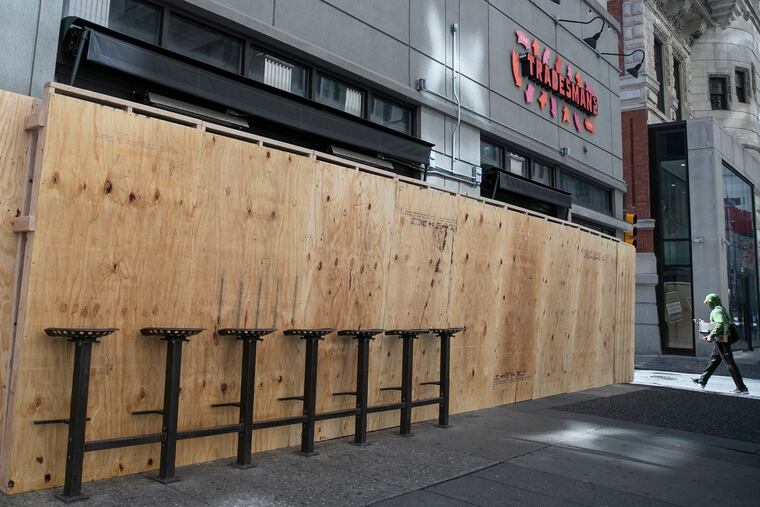‘It looks like hell.’ Coronavirus has Philly businesses boarding up as if bracing for a hurricane
Large swaths of Philadelphia’s business districts are battening the hatches, throwing up three-quarter-inch plywood to protect their enterprises from whatever social unrest may come with the pandemic.

It started with bars, worried about potential vandalism and random break-ins. Then restaurants and state liquor stores began to cover up. Now, even an upscale cosmetics store and a home furnishings retailer are sporting the new look.
Some blocks of Center City appear as if the businesses are preparing for a hurricane.
In a town already suffering through the retail apocalypse, it may not be a good look. But business owners feel it’s a necessity.
Large swaths of Philadelphia’s business districts are battening down the hatches, throwing up thick plywood to protect their plate glass windows and the contents of the enterprises within them. Some owners are fretting about “desperate people” during the coronavirus shutdown of the city.
“The last time there was a rush on boarding up was when the Eagles won the Super Bowl and people thought everyone was going to get crazy,” said Mary DeFrehn, service administrator at Paul C. Rabinowitz Glass. “I’m sure it’s a concern now on everyone’s mind.”
A quick drive through Center City reveals that concern. Along Second Street’s entertainment district in Old City, the windows are boarded up at Brownie’s, Royal Boucherie, Revolution House, the Khyber Pass, and Bootleggers.
On the 13th Street corridor, windows are paneled over at Globar, the Midtown, and Woody’s. On Sansom Street, there’s the jazz bar Time and Irish-theme watering hole Finn McCool’s. And in the tony neighborhood of Rittenhouse Square, the boards cover windows at Drinker’s Pub, Friday Saturday Sunday, and Cavanaugh’s Rittenhouse.
“I was worried about our [liquor] inventory and simple acts of mindless vandalism,” said Joe Krause, co-owner of Drinker’s, at 19th and Walnut Streets. “During the social distancing, nobody’s going to be down there on the street. And after the Police Department decriminalized certain activities, that made me a bit nervous.”
Krause’s nervousness, like that experienced by many other business owners, was triggered by a March 17 memo released by the Philadelphia police that listed modifications to arrest protocols.
But Police Commissioner Danielle Outlaw stated the same day that the department would not be "turning a blind eye to crime.” To reduce the spread of COVID-19, police will detain some alleged offenders at the scene to be fingerprinted and identified. Police will submit paperwork for charges to be filed after the threat of the pandemic dies down.
“No one will escape accountability for the crimes that they commit,” Outlaw said.
Crime in Philadelphia has dropped significantly in the past month, according to police statistics. Commercial burglaries fell 23% during the four weeks ending March 22, compared with the previous month. During the same period, robberies with a gun plunged 31%.
The District Attorney’s Office said it was working together with the Police Department to minimize admissions to county jails in order to prevent outbreaks there.
“That does not mean people who commit serious crimes won’t be held accountable — if arrests are made, the [District Attorney’s Office] will charge appropriately,” said Jane Roh, spokesperson for District Attorney Larry Krasner. “The courts being shuttered might delay prosecutions, but prosecutions will resume after this crisis is over, and consequences for offenders are inevitable.”
Despite the assurances, several retailers aren’t taking chances.
Sephora, the beauty and cosmetics retailer on Chestnut Street, is paneled over in black boards. Its spokeswoman issued a statement saying the chain had “standardized precautions to protect our properties across North America.” She would not elaborate.
West Elm, the upscale home furnishing shop on Chestnut Street, followed suit a week later. The neighboring Blick Art Materials was also fortified with plywood.
A stretch of businesses facing the east side of City Hall was similarly boarded up. The retailers include a Dunkin’ Donuts, a still-open 7-Eleven, and a bank branch.
“The owners said it was an emergency,” said Eduardo Saldana of Pennsylvania Custom Builders, whose seven-man crew was hired to secure that block. “It was a big job. It took all day.”
Saldana said a typical board-up job can run $5,000 to $6,000. He expects a lot more work in the coming month.
The city is not encouraging businesses to board up their establishments, said Deana Gamble, a spokeswoman for Mayor Jim Kenney. “But we understand the desire to do so to prevent vandalism.”
JoAnn Loviglio, spokeswoman for the Center City District, said, “We are not promoting it and would prefer that businesses didn’t, but we fully understand and are not criticizing or discouraging the practice.”
At least two Fine Wines and Good Spirits stores in Philadelphia are taking precautions.
With “no immediate plans to reopen,” the windows of the state liquor stores at 11th and Wharton Streets and Seventh and South Streets are sheathed in plywood. Elizabeth Brassell, a spokesperson for the Liquor Control Board, said fewer than two dozen of the nearly 600 State Stores were boarded up, a decision determined by “prior break-in history.”
Scott Hartzell is a veteran agent with a national clientele at Hartzell Insurance Associates in Hatboro.
“It looks like hell, I’m sure, but better to be safe than sorry,” Hartzell said. “It’s all about mitigating loss. By boarding them up, they’re making it harder for a burglar or a looter or an arsonist. It’s a smart thing to do.”